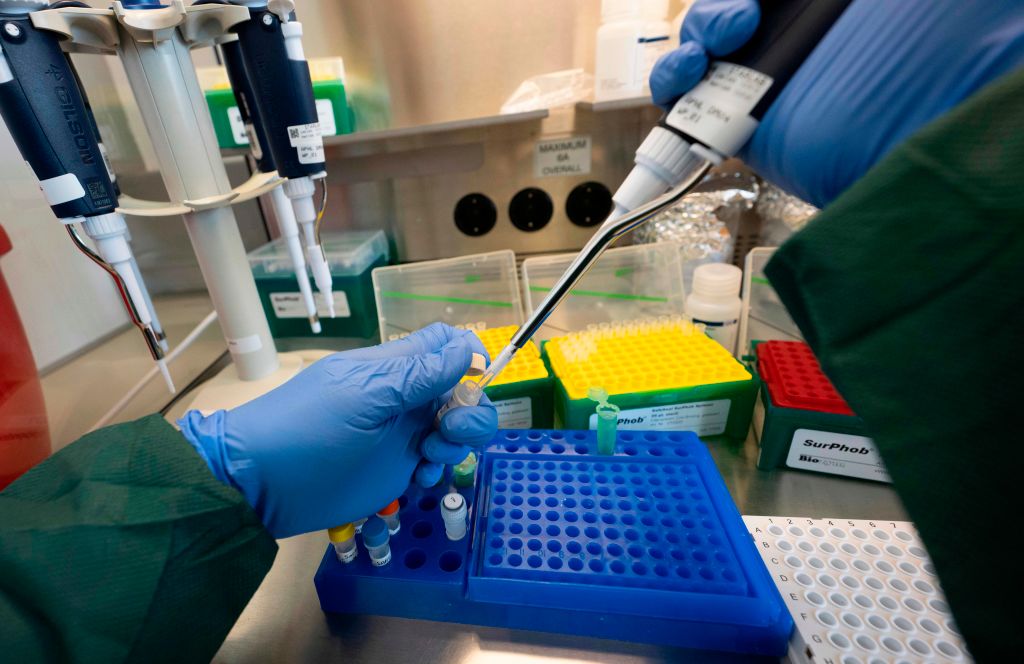2 new studies offer optimism that coronavirus antibodies provide immunity


A free daily email with the biggest news stories of the day – and the best features from TheWeek.com
You are now subscribed
Your newsletter sign-up was successful
Two new peer-reviewed studies published in Science on Wednesday have scientists feeling optimistic about coronavirus antibodies providing both natural and vaccine-induced immunity against future infections, The Boston Globe reports.
The research teams led by Dr. Dan Barouch, head of Beth Israel's Center for Virology and Vaccine Research, found rhesus macaque monkeys were immune to the coronavirus after being re-injected with the live virus following recovery from their initial infection. And a separate study found two doses of one of six DNA vaccine prototypes — ones that use the genetic code for portions of a protein the coronavirus likely uses to invade cells — also provided protection.
DNA vaccines reportedly aren't in development for human testing, and scientists are reportedly skeptical of their efficacy, but that's why some are excited about the results of the study. The fact that DNA vaccines worked on the monkeys and in some cases developed antibodies at levels comparable to those produced by the response to the live virus "really tell you this is doable," said Dr. Michael Nelson, director of the Center for Infectious Diseases Research at the Walter Reed Army Institute of Research.
The Week
Escape your echo chamber. Get the facts behind the news, plus analysis from multiple perspectives.

Sign up for The Week's Free Newsletters
From our morning news briefing to a weekly Good News Newsletter, get the best of The Week delivered directly to your inbox.
From our morning news briefing to a weekly Good News Newsletter, get the best of The Week delivered directly to your inbox.
Barouch was cautious about the results, noting that more research needs to be done in humans. Rhesus macaques, which are frequent test subjects in global coronavirus research, are about as close as scientists can get to humans in terms of genetic makeup, but they're still a different species. And the jury is still out on how long immunity might last. Still, Barouch believes the findings are a cause for optimism. "Our team found this data very compelling," he said. Read more at The Boston Globe.
A free daily email with the biggest news stories of the day – and the best features from TheWeek.com
Tim is a staff writer at The Week and has contributed to Bedford and Bowery and The New York Transatlantic. He is a graduate of Occidental College and NYU's journalism school. Tim enjoys writing about baseball, Europe, and extinct megafauna. He lives in New York City.
-
 At least 8 dead in California’s deadliest avalanche
At least 8 dead in California’s deadliest avalancheSpeed Read The avalanche near Lake Tahoe was the deadliest in modern California history and the worst in the US since 1981
-
 Political cartoons for February 19
Political cartoons for February 19Cartoons Thursday’s political cartoons include a suspicious package, a piece of the cake, and more
-
 The Gallivant: style and charm steps from Camber Sands
The Gallivant: style and charm steps from Camber SandsThe Week Recommends Nestled behind the dunes, this luxury hotel is a great place to hunker down and get cosy
-
 Trump HHS slashes advised child vaccinations
Trump HHS slashes advised child vaccinationsSpeed Read In a widely condemned move, the CDC will now recommend that children get vaccinated against 11 communicable diseases, not 17
-
 FDA OKs generic abortion pill, riling the right
FDA OKs generic abortion pill, riling the rightSpeed Read The drug in question is a generic version of mifepristone, used to carry out two-thirds of US abortions
-
 RFK Jr. vaccine panel advises restricting MMRV shot
RFK Jr. vaccine panel advises restricting MMRV shotSpeed Read The committee voted to restrict access to a childhood vaccine against chickenpox
-
 Texas declares end to measles outbreak
Texas declares end to measles outbreakSpeed Read The vaccine-preventable disease is still spreading in neighboring states, Mexico and Canada
-
 RFK Jr. shuts down mRNA vaccine funding at agency
RFK Jr. shuts down mRNA vaccine funding at agencySpeed Read The decision canceled or modified 22 projects, primarily for work on vaccines and therapeutics for respiratory viruses
-
 Measles cases surge to 33-year high
Measles cases surge to 33-year highSpeed Read The infection was declared eliminated from the US in 2000 but has seen a resurgence amid vaccine hesitancy
-
 Kennedy's vaccine panel signals skepticism, change
Kennedy's vaccine panel signals skepticism, changeSpeed Read RFK Jr.'s new vaccine advisory board intends to make changes to the decades-old US immunization system
-
 Kennedy ousts entire CDC vaccine advisory panel
Kennedy ousts entire CDC vaccine advisory panelspeed read Health Secretary RFK Jr. is a longtime anti-vaccine activist who has criticized the panel of experts
